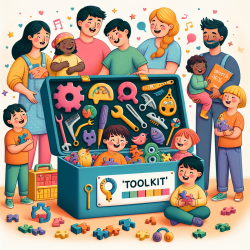The recent study titled "Developing the FEEDS toolkit of parent-delivered interventions for eating, drinking and swallowing difficulties in young children with neurodisability: findings from a Delphi survey and stakeholder consultation workshops" provides significant insights for practitioners working with children experiencing eating, drinking, and swallowing difficulties (EDSD). This blog aims to help practitioners enhance their skills by implementing the research outcomes or encouraging further investigation.
The study utilized a Delphi survey and stakeholder consultation workshops to achieve consensus among parents and health professionals on the appropriate interventions and outcomes for children with neurodisability and EDSD. The research identified 19 essential interventions and 10 critical outcomes that can significantly impact the well-being of children and their families.
Key Interventions Identified
The interventions deemed essential include:
- Modifying the environment to reduce distractions or using distractions to divert attention from food.
- Ensuring proper positioning to facilitate safe and efficient eating and drinking.
- Modifying equipment such as using different spoons, forks, or cups.
- Scheduling meals to establish a routine and encourage appetite.
- Changing the consistency of food or drink to suit the child's needs.
- Enhancing communication between the child and the feeder.
- Using visual supports like pictures or social stories to help the child understand mealtime activities.
- Responding to the child's cues for feeding to ensure readiness for the next mouthful.
- Providing physical support to improve the movements needed for biting, chewing, and swallowing.
- Offering psychological support for the child and their family.
Key Outcomes Identified
The outcomes considered crucial include:
- Nutrition: Ensuring the child receives adequate energy and nutrients for healthy growth.
- General health: Monitoring the child's overall health.
- Growth: Tracking changes in the child's height and weight.
- Child’s enjoyment of mealtimes: Ensuring the child finds mealtimes enjoyable.
- Quality of life of the child and family: Improving overall satisfaction with life.
- Mental health of the parent or caregiver: Supporting the emotional well-being of caregivers.
- Safety: Ensuring the child can eat and drink without choking or aspirating.
- Oral-motor control: Improving the child's ability to control mouth movements.
- Mealtime interaction: Enhancing the interaction between the child and the feeder during meals.
- Social participation: Increasing the child's involvement in mealtime activities.
Implementing the FEEDS Toolkit
The FEEDS Toolkit comprises these essential interventions and outcomes, offering a comprehensive approach to addressing EDSD in children with neurodisability. Practitioners can utilize this toolkit to tailor interventions based on the individual needs of each child and their family, ensuring a holistic and flexible approach.
By incorporating these evidence-based interventions into practice, practitioners can significantly improve the quality of life for children with neurodisability and their families. Additionally, the toolkit emphasizes the importance of shared decision-making between parents and health professionals, fostering a collaborative approach to care.
Encouraging Further Research
While the FEEDS Toolkit provides a robust framework for addressing EDSD, further research is needed to evaluate its feasibility, acceptability, and effectiveness. Practitioners are encouraged to participate in ongoing research efforts to refine and validate the toolkit, ensuring it meets the diverse needs of children with neurodisability.
To read the original research paper, please follow this link: Developing the FEEDS toolkit of parent-delivered interventions for eating, drinking and swallowing difficulties in young children with neurodisability: findings from a Delphi survey and stakeholder consultation workshops.










